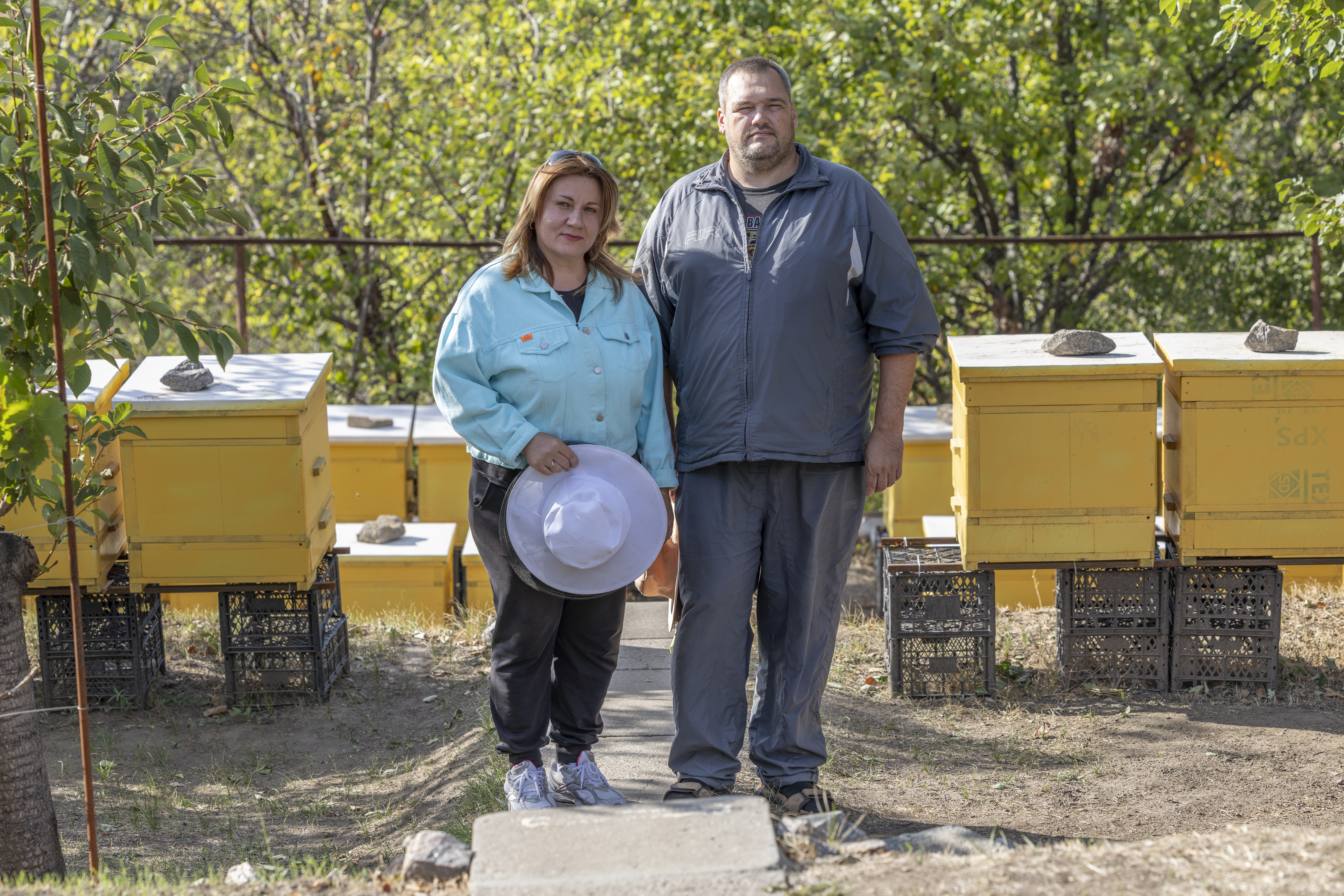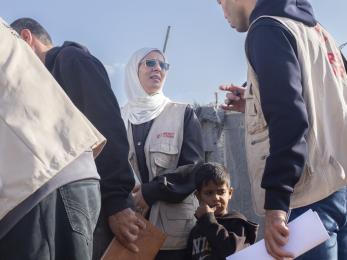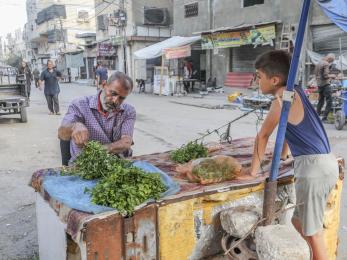7 inspiring ways our teams are taking on today’s challenges
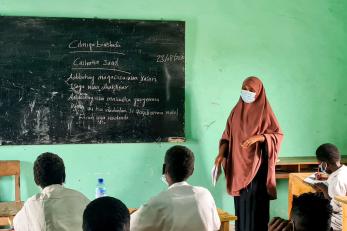
Last year will no doubt be remembered as one of crisis and turmoil. But against the odds, people in communities around the globe persevered and forged a path forward. When our team members look back, what they see is progress — what can be achieved when we all work together.
To shape a brighter future for every person and every community, it takes all of us working together with determination and a vision for what’s next. As you find new ways to spark change in your community and for people you may never meet, get inspired by the Mercy Corps team members across the globe who are making an impact.
1. Team Kyrgyzstan refuses to let COVID‑19 cancel classes
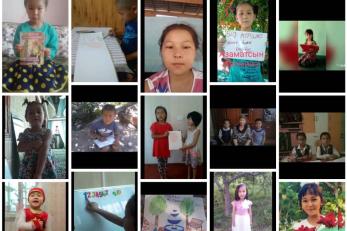
Since March, COVID‑19 has kept primary-grade children out of school in Kyrgyzstan. Our teams digitized dozens of books, helped 1,900 parents organise educational activities, initiated remote reading summer camps with 224 schools and supported 600 teachers as they prepared to teach online.
The reading camps inspired teachers and captivated students in some of Kyrgyzstan's most rural areas. By providing this support to children now, we can ensure they don’t fall behind during this critical time in their educational development.
“The lockdown has brought new challenges, but also opportunities to develop new creative solutions. In the coming year, we look forward to supporting the education of even more children.”
‑ Nurzat Esengulova, Mercy Corps Director of Programmes in Kyrgyzstan
2. Team Nigeria turns the dial toward peace and education
As lockdowns threaten education for girls and the virus raises tensions in communities, our team in Nigeria found a creative approach accessible to nearly everyone: radio.
By putting lessons on the air our team helped provide schooling for thousands of girls during the COVID‑19 lockdowns. Through the radio, WhatsApp and SMS texts, students took classes on English, mathematics and life skills. This prevented a pause in education and provided a means for bonding with family through a shared learning experience.
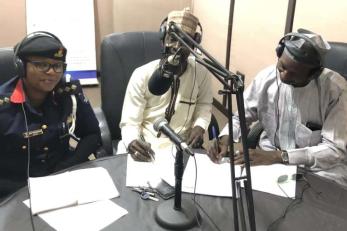
“We hope to hit the ground running, reducing conflict and engaging more women in the peacebuilding process to further our efforts!”‑ Rahama Baloni, Mercy Corps Senior Programme Officer in Nigeria
In addition, team members produced a radio programme to amplify a message of peace to communities competing for natural resources during the pandemic. By broadcasting how working together is the most effective way to stay safe and take on shared challenges, our team is strengthening communities against violent extremism and slowing the spread of COVID‑19. The radio programme also allows community members to call in and join the discussion, with more than 1,400 listeners already having received advice so far.
3. Team Democratic Republic of Congo ensures communities lead the way forward
It’s essential that every community guide the solutions to the challenges they face. That's why our team helped 24 communities establish distinct COVID‑19 resilience plans that support the unique needs of that community. Together, they set up hand-washing stations for thousands of people in high-traffic public areas, provided farming supplies to 826 families, reached 1,409 families with critical health information, and negotiated with local traders for the fair prices of basic goods.
By working with local leaders, our team members are building lasting strength within communities as they face the pandemic and for the challenges ahead.
“Our teams will strive to put communities at the centre of their own empowerment and ensure we're solving problems from the bottom up.”‑ Thierry Kayandi, Mercy Corps Senior Officer in the Democratic Republic of Congo

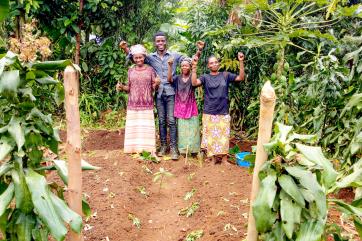
4. Mercy Corps Northwest backs small businesses with pandemic relief
Small businesses and women entrepreneurs have been hit hard by the pandemic. To help them hit back, our Mercy Corps Northwest team is assisting small businesses in Oregon and Washington states with upwards of $1 million in grants. This has proven to be a lifeline for 213 small business owners who are grappling with the economic downturn.
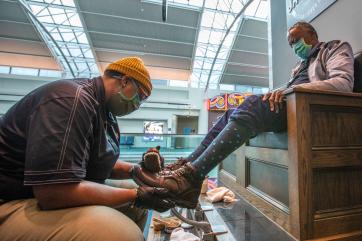
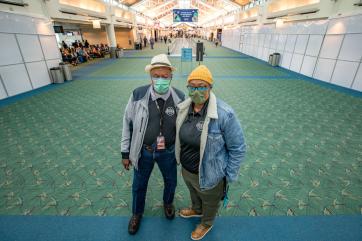
In addition to financial support, our Women’s Business Centre has provided one-on-one consulting to 150 entrepreneurs and more than 600 small business owners through free online training. When small businesses can bounce back from crisis, they power their local economies and enrich their communities for years to come.
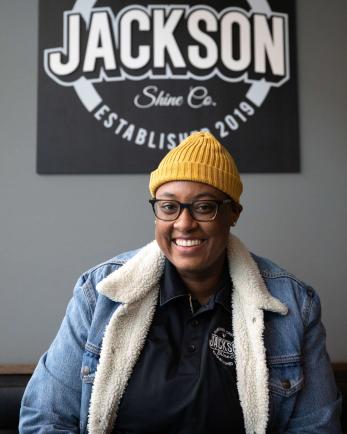
“Besides continuing to provide support that keeps small and microbusinesses on their feet, we also hope to expand accessibility of our digital business resources and set up a sustainable mentorship network that can provide essential expertise to micro-entrepreneurs.”
‑ Stefka Waite, Project Manager in the United States
5. Team Puerto Rico creates a blueprint for healthy communities
To help communities in Puerto Rico slow the spread of COVID‑19, our team members created a design for handwashing stations that use rainwater. The DIY design, manual and tutorial reached more than 15,000 people on social media.
Not only does this solution provide people with a new affordable and sustainable way to keep their own communities healthy during the pandemic, it will be a vital resource for people recovering from hurricanes and other natural disasters in the future.
“We want to do even more to meet urgent needs in our communities, and bring smart new ideas to people all across the archipelago.”‑ Alfredo Perez, Mercy Corps Infrastructure Project Officer in Puerto Rico
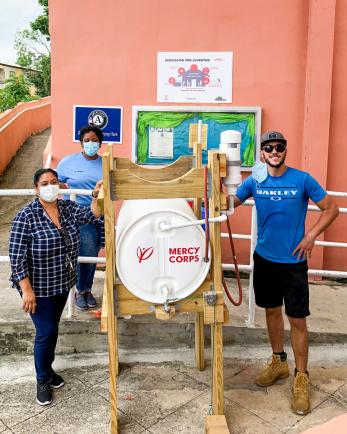
6. Team Somalia builds a workforce … and better farms
This year, our team in Somalia planted the seeds of prosperity with a farmland rehabilitation project. By paying nearly 2,000 people to improve irrigation canals, ditches, troughs and culverts, we’re helping community members meet their immediate financial needs while strengthening their futures. A total of 2,400 hectares of farmable land has been reclaimed for hundreds of smallholder farmers, increasing food availability for nearly 8,000 families.
“Our goal is to ensure we reach the most marginalised, most vulnerable of our communities and leave a sustainable impact.”
‑ Abdiqalak Mohamed, Mercy Corps Education Programme Officer in Somalia
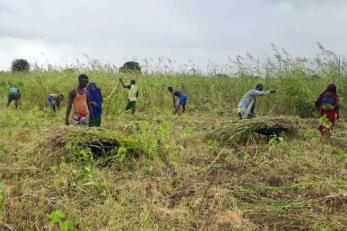
7. Team Lebanon helps small businesses rebuild after a devastating explosion
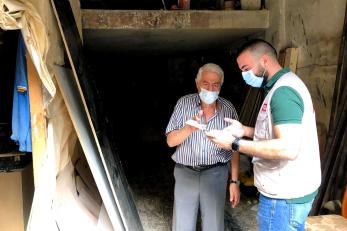
After the explosion in Beirut, our team led eight international and local organisations in determining the needs of over 1,300 affected small businesses, 79% of which were unable to pay rent. Now, Mercy Corps is providing cash grants to the micro and small businesses most affected by the blast, with a focus on women-owned and women-employing businesses.
Cash grants will help these small businesses repair damaged infrastructure, restock inventory and reopen, while some will choose to cover their families’ essential needs that have been neglected due to the loss in income.
“We hope to reach hundreds of small businesses, expanding beyond their immediate needs to improve their supply chains, their marketing and sales, and their ability to provide better services. We hope to create real change they are able to carry forward and to build a better future for themselves.”
‑ Abbas Fadlallah, Mercy Corps Emergency Response Project Manager in Lebanon
Your support
You can join our community of humanitarians and be part of what’s next. With your help, our teams can continue to work with communities to take on the world’s toughest challenges. Together, we have the power to reshape the world.
